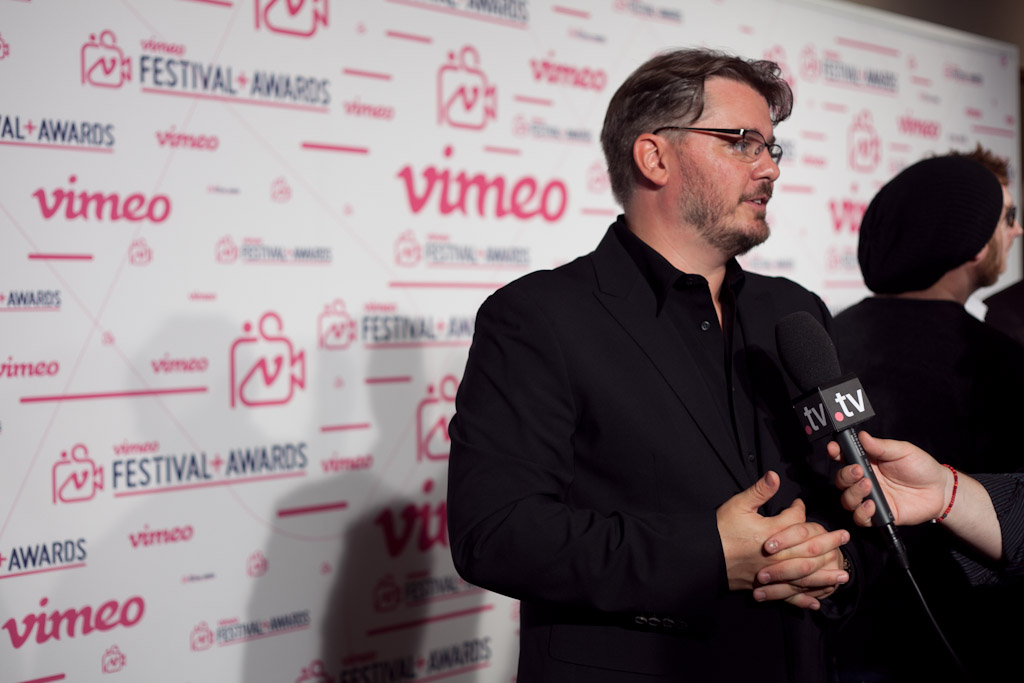Last week in New York City, plaid-shirted twenty-somethings descended upon the IAC headquarters in Chelsea to partake in workshops, conversations, screenings and a free Biergarten at the Vimeo Festival
While Vimeo might be a household name to most filmmakers, it certainly hasn’t reached the broad recognition that YouTube has. But with live events like this and the support of its ever-growing community, it might catch up one day.
Or maybe it won’t. And it seems Vimeo’s community would be just fine with that.
an un-film-festival
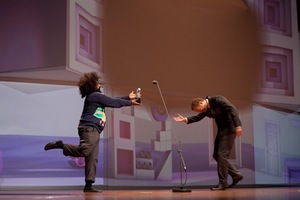
The Vimeo festivities began with an awards show at NYU’s Skirball Center for the Performing Arts on Thursday night. Despite starting late and having a few technical glitches, it moved at a quick pace, helped along by the musical and comedic offerings of Reggie Watts and Beardyman.
Vimeo Festival Director Jeremy Boxer shared that they had made it a priority that the awards show didn’t fall into the trap many such events suffer from — mainly that awkward time allocated for the winners to get out of their seats and get to stage to receive, in this case, a giant “V” statuette. Vimeo’s solution was one of my favorite parts of the awards show: short videos created by the filmmakers to speak to one moment that changed the filmmaking process for them. Each was a unique and personal look at behind-the-scenes moments of the winning films.
My personal favorite came from the French filmmaking duo Cokau, made up of Achille Coquerel and Thomas Kauffmann, that screened just before they accepted the award for their short film, “Prie Dieu,” in the Experimental category. Who knew a praying mantis could be so temperamental?
If community building is a key element to Vimeo’s success, nothing demonstrated that more than the number of projects that made the shortlist that, like Cokau, were made up of a team of two or more filmmakers. Collaboration was a common word spoken throughout the two-and-a-half day event.
a festival for the online ‘orphans’
Boxer explained the festival was birthed out of a need no one was fulfilling: an award program set up to celebrate the gold standard of online video.
“We noticed there were a lot of film festivals and other events that didn’t accept works that premiered online, so we felt that works we celebrated in our Staff Picks were getting orphaned from the system,” Boxer said.
I felt a general “buck the system” vibe permeating the festival and the winners. This year’s theme was “The End of the Beginning,” and Boxer explained it like this: “We believe online creativity and online video are on the precipice of a massive change. Tools have been democratizing the playing field to such a degree that there has been a blurring of the line between amateur and pro.”
2010 Grand Prize winner Eliot Rausch told me, “We are celebrating something super-revolutionary. It’s a movement of filmmakers and people that have a real passion to tell stories. On the ground here at the festival, it feels like some kind of renaissance, a new era of culture and a community that is really trying to help each other get there. It used to be elite, and the gatekeeper was just sitting there and not allowing you into their world. Now, it’s a bunch of rebels that get it and are high-fiving each other.”
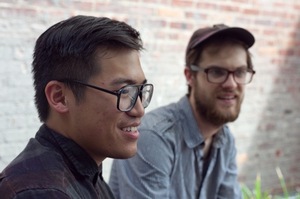
High-fiving was mandatory in winner DANIELS’ workshop, “99 Secrets Every New Filmmaker Should Know.” DANIELS is a filmmaking team made up of two high-energy Daniels, Daniel Scheinert and Daniel Kwan. It was a packed room, and DANIELS began the workshop by declaring they had no interest in chatting about filmmaking. A wonderfully confused audience found themselves at one point slow-motion sword fighting with bright-colored plastic bats that, low and behold, did end up being a technique DANIELS use often on set in their popular music videos with bands such as The Shins or Manchester Orchestra.
I spoke with them afterward, and Scheinert said they wanted the workshop to be about what really inspires them. He said they researched creativity and where ideas come from to prepare for it. He added, “We wanted to give an honest look into our process. It (the workshop) was hyper and disorganized, but that’s how we work.”
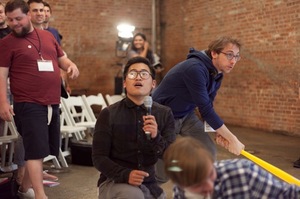
Bob Dylan is quoted as having said, “A man is a success if he gets up in the morning and gets to bed at night, and in between he does what he wants to do.” This could have been the slogan for the Vimeo festival. The winning filmmakers I spoke with all had a passion to express their artistic vision on their own terms and from that, build an audience and even careers. As Kwan shared of their experience, “I don’t know that many people who had their entire careers happen on the Internet. We started out doing things for fun by ourselves, and then slowly we became people who actually started doing things for work and working with these big artists.”
The other Daniel added, “We joined Vimeo as fanboys being like, ‘Maybe one day we’ll be a Staff Pick,’ and then literally the first thing we made together got staff picked. Vimeo’s been a huge part of our career. It’s been the home of our career. We got staff picked so much we were like, ‘We are so lucky, we look like such jerks.’”
for the community, by the community
While there were a few celebrities involved (Ed Burns and James Franco are names you may recognize), for the most part, the event was made up of the community.
This was not lost on Rausch, veteran of two Vimeo festivals. “For Vimeo to trust these filmmakers to judge the films is such a statement on their behalf, because it just shows they are continuing to partner with the community rather than stand above it and judge it or bring in Hollywood elite to comment,” he said. “It’s risky when you don’t have big names attached; the PR isn’t as substantial because ‘so and so’ isn’t going to be there on the Red Carpet. Where we are now, a lot of us don’t give a s—- about those guys anymore. We’re totally about being punk rock and supporting each other.”
Scheinert continued this unity theme, “Vimeo is our dating website of friendship. We both hate networking, but in the past few years we’ve had a revelation. Networking is just ‘friending.’ You don’t have to go up to the best filmmaker and get him to notice you. You just have to find people who laugh at the same jokes as you and hang out with them. Vimeo helped us stumble upon those creative, goofy people.”

DANIELS made a point in all their events to state they only like to work with friends on their projects.
They were not the only winner to pull from the Vimeo community to find not only friends but crew. Rausch said he finds DPs (directors of photography) that way. Will Hoffman and Daniel Mercadante (Julius Metoyer was unable to attend), who make up this year’s Grand Prize winner, Everynone, told me they had needed a shot of a piano being dropped from a building and knew it would cost them thousands of dollars that they didn’t have for their short film, “Words.” They reached out to a fellow Vimeo filmmaker, Jeff Desom, and he was able to help them.
technology aside, it’s the support that built vimeo
Repeatedly, filmmakers shared with me that they were drawn initially to the quality and other technical elements of Vimeo, but it was the community support that they found to be a welcome break from the negativity on some other video web-hosting sites. “The community is respectful and well-behaved, something you barely have anywhere else on the Internet. It’s a little haven,” said headliner Reggie Watts.
Watts went onto tell me he believed Vimeo worked hard to not favor anyone. “I’m just like anybody else — just hanging out in this weird sphere,” he said.
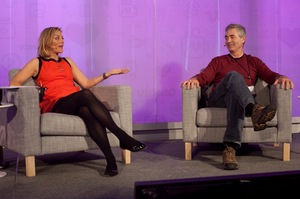
I couldn’t attend every panel or conversation, but the intimate talks, such as with Steve James and Lucy Walker asking each other questions instead of a third-person moderator, seemed a perfect example of how Vimeo was trying to set itself apart.
Boxer explained that keeping the event small and intimate was a priority for Vimeo, even though attendance did increase by over 25 percent from 2010’s event.
In 2010, Boxer said, they had 6,500 submissions and were taken completely by surprise. They prepped better this year, though he did share that more than two-thirds of the 14,500 submissions came in the last week. This amount is more than double what some of the more famous festivals out there receive, a fact Boxer was proud to share.
I asked Boxer why it’s an 18-month cycle instead of yearly, and he responded, “It gives us enough time to figure out what’s going to be relevant and preferable — future looking. It also gives our community time to make new work. We need percolating time as well.” He added that many film festivals are struggling to find an online presence to communicate with their audience between their yearly events but that Vimeo does that on a daily basis.
Unlike other film festivals, where you’d have to wait patiently for the film to, fingers crossed, be released theatrically or on video on demand, you can watch all the Vimeo winners here.
Amanda Lin Costa is a writer and producer in the film and television industry. She writes a series called “Truth in Documentary Filmmaking” and is currently producing the documentary, “The Art of Memories.”
Correction: This story has been altered to correct Lucy Walker’s last name.
